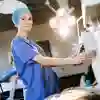




This online programme is perfect for a clinician who is looking to consolidate their existing knowledge, continue their professional development or advance into a new role.
You’ll have the flexibility to study in your own time from the comfort of home under the support of our expert lecturers.
And our programme has been designed to give our students not just a qualification, but also skills to take back into practice that will enhance your current and future job prospects.
About this course
We recognise that studying whilst juggling work and personal commitments is challenging, which is why teaching on this course is both live and recorded. This gives you the opportunity to engage with your lecturers when you can, with the flexibility to study when you want, where you want and for how long you want.
Our programme consists of a range of 10 credit modules that are delivered totally online by academics and clinicians who are experts in their field.
We use the latest digital teaching techniques to offer bespoke content, with our modules designed to give you a solid foundation in all aspects of safe and compassionate care – all underpinned by the latest research and evidence.
Learning methods include workshops, discussions, group activities and tutorial support and we also offer a range of assessment methods, from traditional academic assignments to poster presentations and exams.
Plus, we work with our NHS partners to ensure our course is constantly updated to reflect the very latest in healthcare needs and challenges.

PGCert Clinical Practice
1 min
Module options
For a full Masters degree, you'll study 180 credits over the duration of your course. Some programmes offer a Postgraduate Diploma (PGDip) qualification or a Postgraduate Certificate (PGCert) qualification. For a PGDip, you'll study 120 credits, and for a PGCert, you'll study 60 credits.
Filters
The Deteriorating Child
This module will provide you with the theoretical underpinning knowledge that is required to recognise the deteriorating child. The module is taught by academic staff and current practicing clinicians who are experts in their field. You will learn how to use a systematic approach of assessment to identify and treat the deteriorating child presenting with a variety of chronic and acute conditions.
core
10 credits
Electrocardiograph (ECG) interpretation
This module will provide you with the theoretical underpinning knowledge that is required to begin to interpret ECGs in clinical practice. The module is taught by academic staff and current practicing clinicians who are experts in their field. You will learn how systematically interpret and relate a variety of ECGs to acute disease pathologies and a variety of long term cardiac conditions.
core
10 credits
Clinical Reasoning Theory
Clinical reasoning is seen as a key skill that healthcare practitioners working at an advanced level need to possess. Without these skills there is clear evidence to suggest patients come to harm and learning about clinical reasoning is seen as important to meet the demands of today. This module enables practitioners to understand the key theoretical underpinnings of clinical reasoning.
core
10 credits
Chest Radiograph (X-Ray) Interpretation
This module will provide you with the theoretical underpinning knowledge that is required to begin to interpret chest radiographs in clinical practice. The module is taught by academic staff and current practicing clinicians who are experts in their field. You will learn how to identify anatomical landmarks, systematically interpret and relate a variety chronic and acute disease pathologies to a variety of high definition chest radiographs.
core
10 credits
Haematological and Biochemistry Interpretation
This module will provide you with the underpinning knowledge that is required to begin to interpret Haematological (the full blood count) and Biochemistry (electrolytes, urea and creatinine and liver function) tests in clinical practice. The module is taught by academic staff and current practising clinicians who are experts in their field. You will learn how to interpret these tests in relation to specific disease pathologies and how these tests can be used to form a differential diagnosis or confirm a diagnosis.
core
10 credits
Infection, Immunity and Anti-Microbial Therapies
Develop your knowledge, confidence and competence in providing care for patients with infections. Building upon your clinical experience and case studies from practice, you will be challenged to interrogate the evidence that underpins clinical decisions.
core
10 credits
Triage and Assessment in Healthcare
Most healthcare environments have elements of triage. There are often formal triage structures in place prioritising treatment or patient care. But, we also triage subconsciously in every day clinical practice. This module will provide you with the theoretical underpinning knowledge that is required to begin to explore your own experiences of triage. Completing this module will allow you to understand when and why triage is necessary as well as the current evidence base behind decision making. The module is taught by academic staff and current practising clinicians who are experts in their field. This module is completely online using the latest digitally enhanced teaching techniques and delivered asynchronously (in your own time) and synchronously (through workshops, group activities and tutorial support).
core
10 credits
Trauma Assessment and Management
This module will provide you with grounded and functional cognition surrounding the theory of trauma assessment and management. Prehospital primary assessment will be examined and discussed, evolving and assuring your understanding of effective, holistic and systematic patient assessment.
core
10 credits
Our academics
Our staff combine teaching and clinical practice with the opportunity to be involved in high-quality research projects.
Their expertise sees them consult with regulatory bodies and government to drive improvement in healthcare and their research is recognised internationally for its quality.

Zach North
Senior Lecturer in Advanced Clinical Practice
Zach started as a student at Hull in 2006, going on to hold leadership positions within the NHS. Now a programme and academic lead at postgraduate level, he teaches on a range of courses, including Clinical Practice and Advanced Practice.

Josey Coaten
Lecturer and Programme Director of Advanced Clinical Practice
Josey is an experienced Advanced Clinical Practitioner with a background in primary care. She has additional qualifications as a Non-Medical Prescriber and in women’s contraceptive health, with further special interests in palliative care.
Entry Requirements
What do I need?
When it comes to applying for this Postgraduate Taught degree, you'll need an Undergraduate degree (or equivalent). For this course, you'll need a 2:2 from a relevant bachelor's degree.
The programme is designed for graduates who have a studied a subject that is relevant to this course.
If you’re an undergraduate student at Hull, you’re guaranteed a fast-track route to this postgraduate degree, as long as you meet the entry requirements.
In order to ensure our students have a rich learning and student experience, most of our programmes have a mix of domestic and international students. We reserve the right to close applications early to either group if application volumes suggest that this blend cannot be achieved.
Typical offer
2:2 in a relevant subject area
Minimum of a 2:2 Honours degree or international equivalent in nursing, midwifery or another relevant discipline, plus appropriate experience in a professional environment.
Fees & Funding
How much is it?
Tuition fees for 2027 entry have not been confirmed. Please use 2026-27 information as a guide.
Scholarships
We offer a number of awards, bursaries and scholarships for eligible students. They’re awarded for a variety of reasons, including academic achievement and/or to help those on lower incomes.
Scholarships and bursaries are separate to student loans. And the best bit is, you don’t pay a penny back.
Alumni Postgraduate Scholarship
University of Hull undergraduates progressing to a taught masters course may receive a 20% discount on the cost of their tuition fees.
Find out if you’re eligible by visiting the University of Hull Alumni Postgraduate Scholarship page.
See more Scholarships
We offer a range of scholarships and awards to students at the university to help with their financial load.
To view all of our scholarships and determine whether you're eligible, please visit our Scholarships and Awards page.
Our Facilities


Future prospects
Completing this Postgraduate Certificate enables students to develop knowledge and skills in research and leadership as well as education, opening up career pathways in a variety of healthcare environments, training departments and education institutions.
Our programme has been designed to give our students both a qualification and practical skills, and is constantly updated to ensure it remains relevant to the current demands and challenges facing a healthcare professional.
Take your career to the next level
Like what you’ve seen? Then it’s time to apply.
Make your application online now, and our admissions team will get back to you as soon as possible to make you an offer.
Not ready to apply yet?
We regularly deliver virtual and on-campus events to help you discover your perfect postgraduate course, whether it’s a subject you already love or something completely different. Our events are an opportunity for you to chat to tutors and current students and find out about the career options a postgraduate degree could lead to.
You may also be interested in...
All modules on this course page are subject to availability and this list may change at any time.